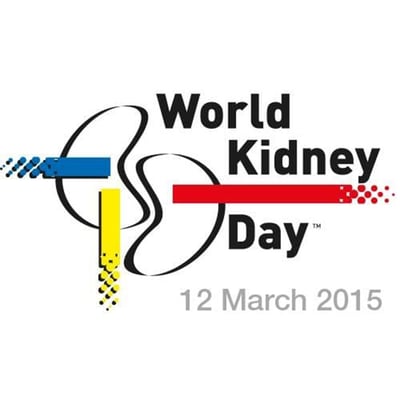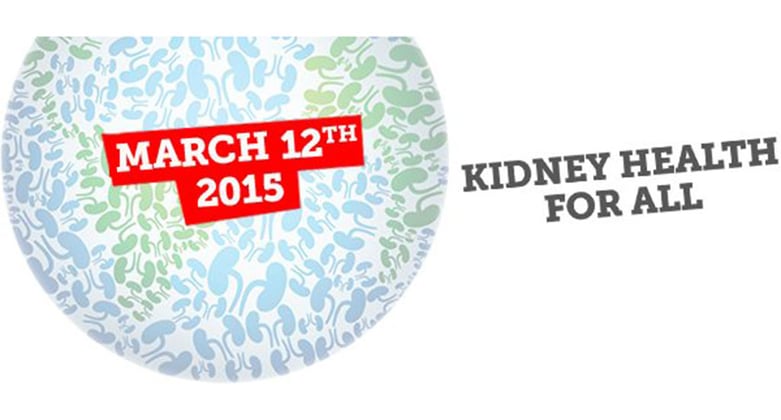 Today is the annual World Kidney Day, held every year on the 12th of March.
Today is the annual World Kidney Day, held every year on the 12th of March.
The UMHS Endeavour looks at what the day signifies for 10% of the world population that has some form of kidney damage and what the public and students at American and Caribbean medical schools can do to raise awareness about kidney health.
Kidney Health for All
World Kidney Day is jointly organized by the International Society of Nephrology and the International Federation of Kidney Foundations. The theme for 2015 is “Kidney Health for All,” reminding people “that not all of us are equal with regards to risk for kidney disease and access to treatment,” according to press materials for World Kidney Day.
Below are facts about World Kidney Day and why there is a need to create more awareness about kidney health.
- With 10% of the population worldwide having some form of kidney damage, there is a long road ahead to raise awareness about the dangers of kidney disease. Chronic Kidney Disease (CKD), which is predicted to increase by 17% over the next decade, is now recognized by WHO and other organizations as a global public health issue.”
- “Some communities in both higher and lower income countries are at greater risk than others because of their ethnic origin, socioeconomic status and/or where they live. This has major public health implications because of the extremely high costs of renal replacement therapy. African, American Indian, Hispanic, Asian or Aboriginal populations are known to suffer from higher rates of diabetes and high blood pressure which are both leading causes for Chronic Kidney Disease (CKD). These populations are therefore at higher risk of developing severe renal disease and ultimately kidney failure. As an example, in the US, African Americans are 3 times more likely to experience kidney failure. Compared with Caucasians, African Americans have a much higher average blood pressure, develop hypertension earlier in life and have greater risks of complications such as CKD, stroke and heart disease.”
Some of the issues and challenges regarding Chronic Kidney in vulnerable populations include “poor water hygiene, lack of hydration, unhealthy choice of food and beverages, language barriers, education and literacy levels, low income, unemployment, lack of adequate health insurance, and certain culture-specific health beliefs and practices – just to name a few,” a press release states.
Kidneys 101
The kidneys are essential for life. "The main job of your kidneys is to remove toxins and excess water from your blood," World Kidney Day press materials say." Kidneys also help to control your blood pressure, to produce red blood cells and to keep your bones healthy. Each roughly the size of your fist, kidneys are located deep in the abdomen, beneath the rib cage. Your kidneys control blood stream levels of many minerals and molecules including sodium and potassium, and help to control blood acidity. Every day your kidneys carefully control the salt and water in your body so that your blood pressure remains the same."
Your Kidneys:
- Make urine
- Remove wastes and extra fluid from your blood
- Control your body’s chemical balance
- Help control your blood pressure
- Help keep your bones healthy
- Help you make red blood cells
Drink a Glass of Water Today & Give One, Too
Organizers ask people on World Kidney Day to “drink a glass of water and give one, too.” Why?
“Sharing a glass of water on March 12 is a good way to remind us that kidneys are vital organs and that they should be taken care of, wherever you live and whether you’re at risk or not,” says The WKD Steering Committee ISN Co-chair, Dr. Philip Li is calling on the whole kidney community and beyond to get involved in this global celebration day. “Taking steps to live a healthy lifestyle clearly helps to reduce risk, and early detection and treatment can slow or prevent the progression of kidney disease.”
Although water might protect your kidneys, there is no scientific evidence that drinking water lowers the risk for CKD.
Kidney disease can be devastating in countries that are not properly equipped to deal with the problem.
“To have end-stage renal disease in Mexico, for example, is a tragedy,” says World Kidney Day Steering Committee IFKF Co-Chair Dr. Guillermo Garcia. “If you don’t have Social Security, if you don’t have private insurance, you are condemned to die.”
For more information, visit www.worldkidneyday.org and www.theisn.org and www.ifkf.org
(Top Photo): © World Kidney Day, 2006-2015
About UMHS:
Built in the tradition of the best US universities, the University of Medicine and Health Sciencesfocuses on individual student attention, maintaining small class sizes and recruiting high-quality faculty. We call this unique approach, “personalized medical education,” and it’s what has led to our unprecedented 96% student retention rate, and outstanding residency placements across the US and Canada.

Scott is Director of Digital Content & Alumni Communications Liaison at UMHS and editor of the UMHS Endeavour blog. When he's not writing about UMHS students, faculty, events, public health, alumni and UMHS research, he writes and edits Broadway theater reviews for a website he publishes in New York City, StageZine.com.















